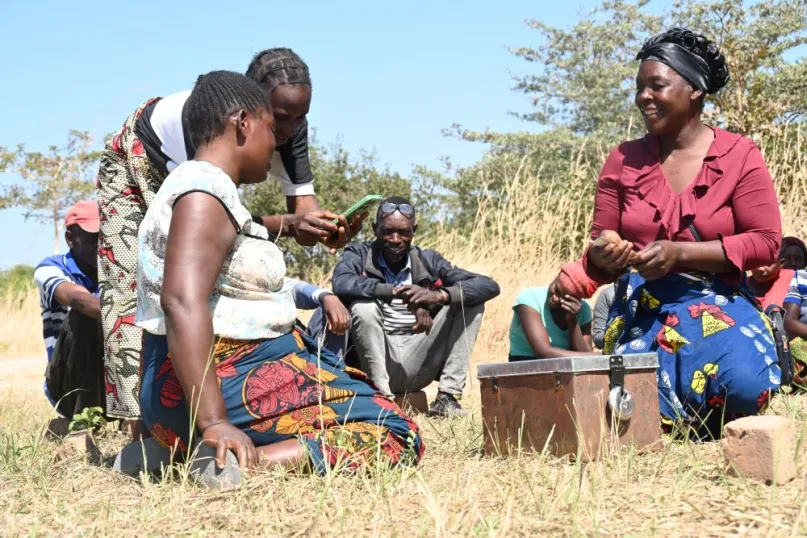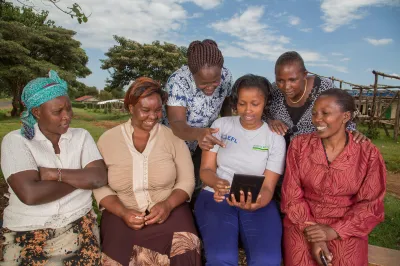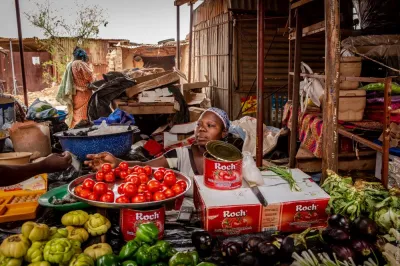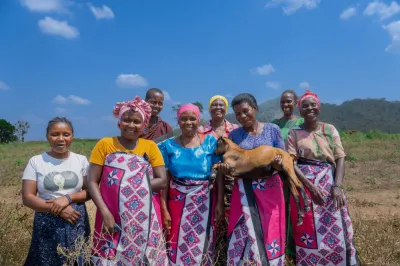Magnifying the Power of Women’s Savings Groups

Studies have shown significant positive effects of savings groups on food security, resilience, increased savings and investment in micro businesses. Worldwide, savings groups have become spaces for the active participation of women and other marginalized groups, enabling them to exercise leadership and decision-making.
Unfortunately, these groups often face challenges in pooling enough funds to cater to the needs of all their members. Since most savings groups distribute their accumulated savings and interest annually, there are times of the year when demand for loans exceeds the availability of funds as members have built up minimal savings.
In practice, groups will typically address this shortfall by dividing the available funds equally among the members requesting loans—resulting in members receiving loans much smaller than they need, or requiring some members to wait weeks or even months to take a loan. Neither solution is ideal for business continuity or for urgent needs.
In agricultural communities, this situation can be exacerbated by the timing of the distribution. To meet the need for funds for inputs during the planting season, some groups time their distribution to be just before planting season. This works well for getting a lump sum in the hands of members in time to plant, but it empties the cashbox during the early part of the growing season, leaving groups especially vulnerable to shocks during the lean season.
This vulnerability is magnified when climate-related disasters like droughts and floods hit the whole community. The demand for funds often exceeds the availability, limiting the savings group's usefulness as a risk-mitigating tool and underscoring the crucial need for complementary financial services to bridge the gap.
Increasing the capital available for savings groups to lend
Recognizing these capital constraints, VisionFund International (VFI) began experimenting with ways to supplement savings with external credit while preserving group autonomy. This led to the development of a specialized loan product called Finance Accelerating Savings Group Transformation (FAST) in 2019.
FAST aims to enhance the group's existing savings mobilization by providing supplemental funds in the form of a loan to the entire group. The funds from this loan to the cash box are then lent out by the group, together with their savings, according to their existing rules and processes. Because these funds are lent out to members at their standard internal loan interest rate—a rate that is higher than the one charged by the external financial service provider—the group earns the difference in the interest rates, generating additional interest income for the group as well as benefiting the members who take out loans.
By making more funds available to savings groups, members can have more consistent access to working capital, accelerating their capacity to generate income and assets from their small businesses. In fact, VFI’s monitoring reports showed that, on average, groups increase their annual share-out by more than 20% when they have an external loan. When disaster strikes, these funds can even help an entire group get back on its feet by making more cash available to its members.
VFI currently provides the FAST product to over 11,000 groups in ten African countries, with good results: average PAR 30 (portfolio at risk 30 days) is less than 2.5%. Key elements that have helped make FAST successful from the perspective of the external lender include:
- Careful evaluation of the quality of the groups.
- A period of pre-credit engagement with the group during which financial education is delivered.
- Use of community-based field agents.
- Technology-enabled compliance monitoring of the credit process.
Because the product is delivered at the group level with no evaluations of individual members, we have found it important to lend only to mature groups with strong internal processes and a solid track record of internal loan repayment and member retention.
Results show improved resilience and well-being
Overall, we see improved well-being and financial resilience from lending to savings groups. As part of its ongoing monitoring, VFI has partnered with 60 Decibels to survey group members at the beginning and end of the cycle in which they receive an external loan to compare the levels of well-being and resilience before and after receiving the external loan. So far, we have seen important improvements across a wide range of household financial well-being and resilience indicators in Malawi, Zambia, Uganda, and Rwanda.
The survey findings showed a significant improvement in the members’ ability to save, repay a loan, plan and contribute to household finances. The majority of the women in savings groups also reported an increased sense of control over their finances and a decrease in financial stress.
Even the savings group members in Malawi, which suffered severe damage from a cyclone when the survey was conducted, showed an increase in overall resilience, highlighting how the program helped families cover unexpected expenses.
Continuing to explore how to support resilience through savings groups
VFI is also exploring other ways to support resilience by linking savings groups to other financial services. A high percentage of households in the surveyed countries had experienced a financial shock in the last 12 months, with a health crisis and the death of a family member being the two most common causes. To address this, VFI has developed insurance products that provide cash payments for savings group members to cover debts, funeral expenses and income loss in the event of death or hospitalization.
Research is also underway to develop recovery lending and climate adaptation loan products for savings groups vulnerable to climate shocks.
We are also strengthening their capacities to recover faster and better from financial shocks and climate disasters. This way, families will not merely survive but once again thrive.


